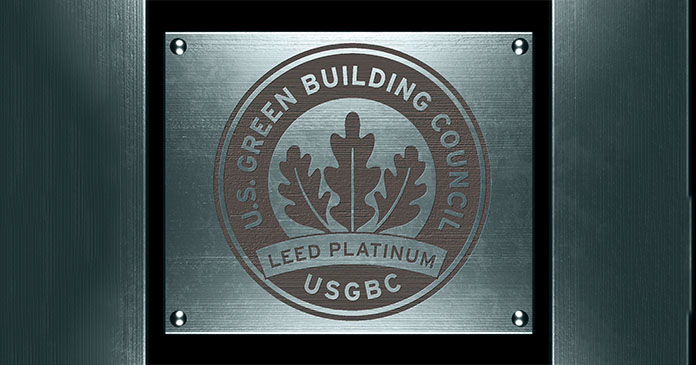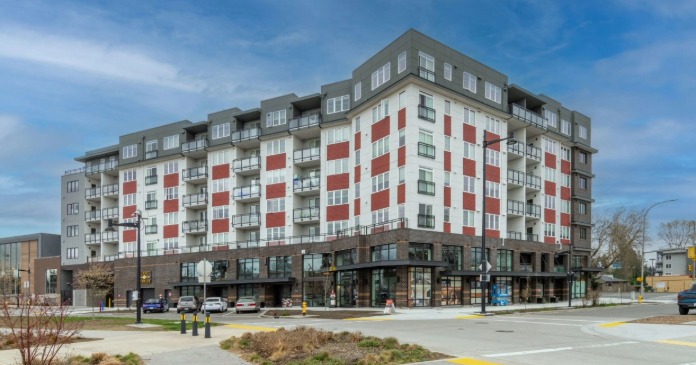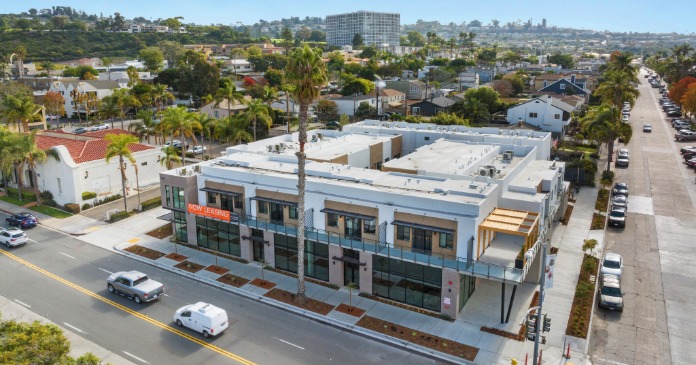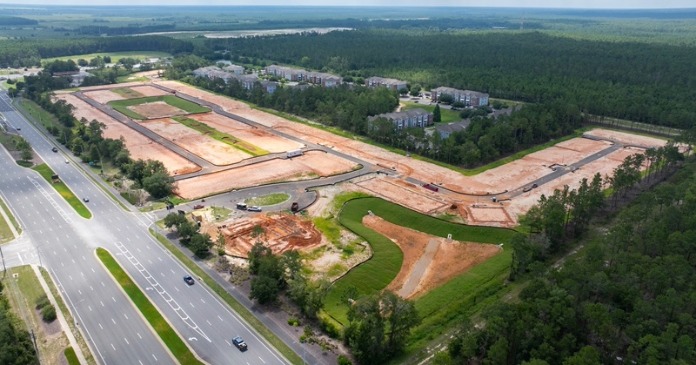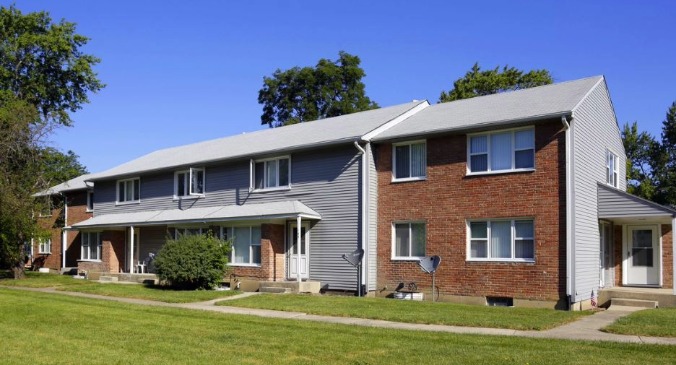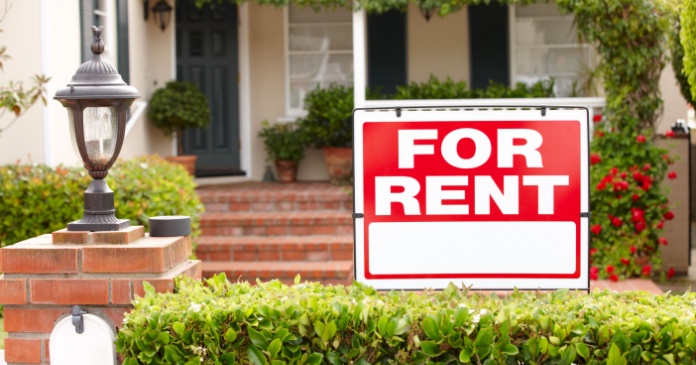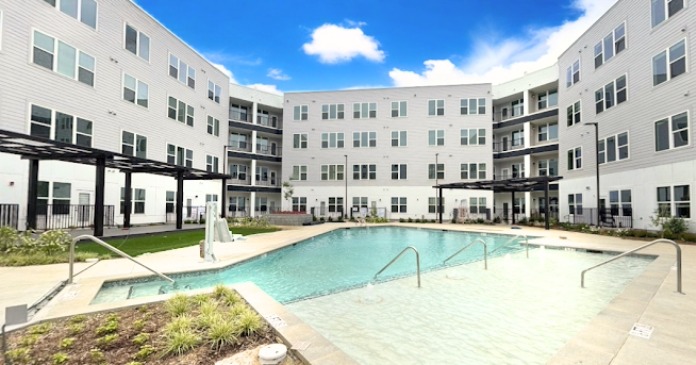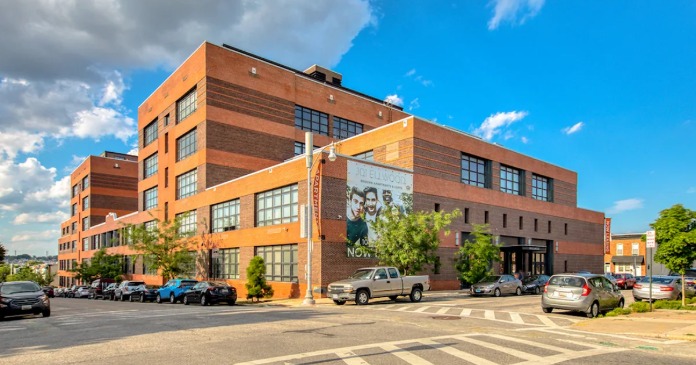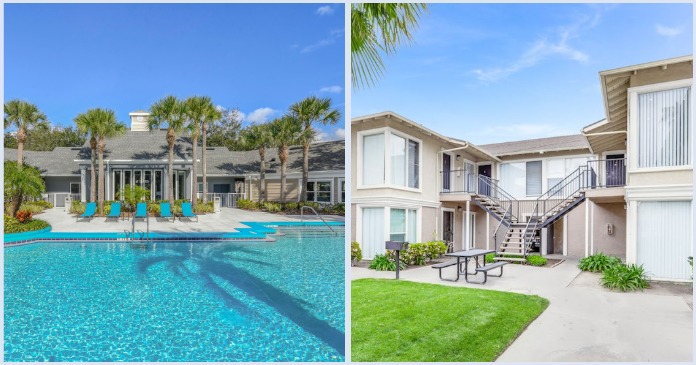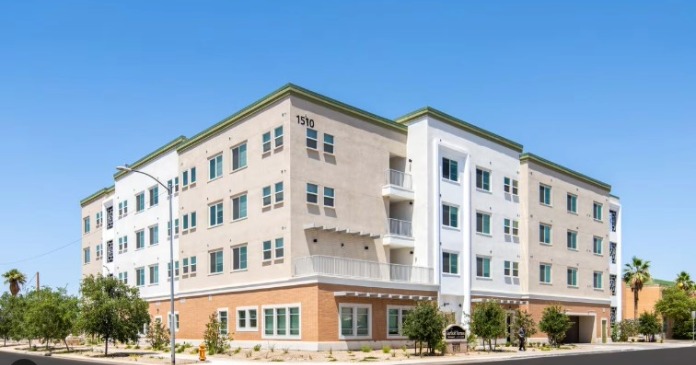Until now, affordable, green and rental housing haven’t always gone hand in hand. With the opening of the first and only affordable apartments in the East Rancho Dominguez redevelopment area, eco-friendly housing no longer can be considered just a symbol of prestige for rich and/or famous homeowners.
Designed, developed and managed by Los Angeles-based non-profit housing developer Abode Communities on a 2.78-acre county-owned parcel in an unincorporated southern Los Angeles County neighborhood south of the city of Compton, the 70-unit Casa Dominguez is the first multifamily rental community in Los Angeles to be awarded a LEED platinum certification by the U.S. Green Building Council.
And the property’s “firsts” don’t end there. Residents of the newly completed Casa Dominguez are enjoying more than an environmentally healthy home. Their own healthcare needs are being addressed onsite at what is the first model for combining a healthcare clinic, a family development center and children’s day-care facility with affordable housing for families and supportive permanent housing for youth aging out of the foster-care system, all in one development.
Located in a two-story, stand-alone building that anchors the far north corner of the site, the 66-space childcare center and the medical, dental and mental health facilities are available to residents, as well as the uninsured and economically disadvantaged from the surrounding community, where this $32 million mixed-use development is helping to put a fresh face on a blighted mostly industrial area sorely in need of revitalization.
Abode Communities was chosen as developer for the project over a dozen other applicants in a request for proposal process issued in 2003 and awarded in 2004 by the Housing Development and Preservation Division of the Los Angeles Community Development Commission.
“The Commission had a very clear vision, based upon their work with the community, of what they wanted on this site in terms of affordable housing. They also wanted another anchor for this relatively large site in their redevelopment project area that was a non-residential use,” said Robin Hughes, president of Abode Communities, which currently owns and manages 34 properties that are home to more than 4,000 residents throughout the Los Angeles region.
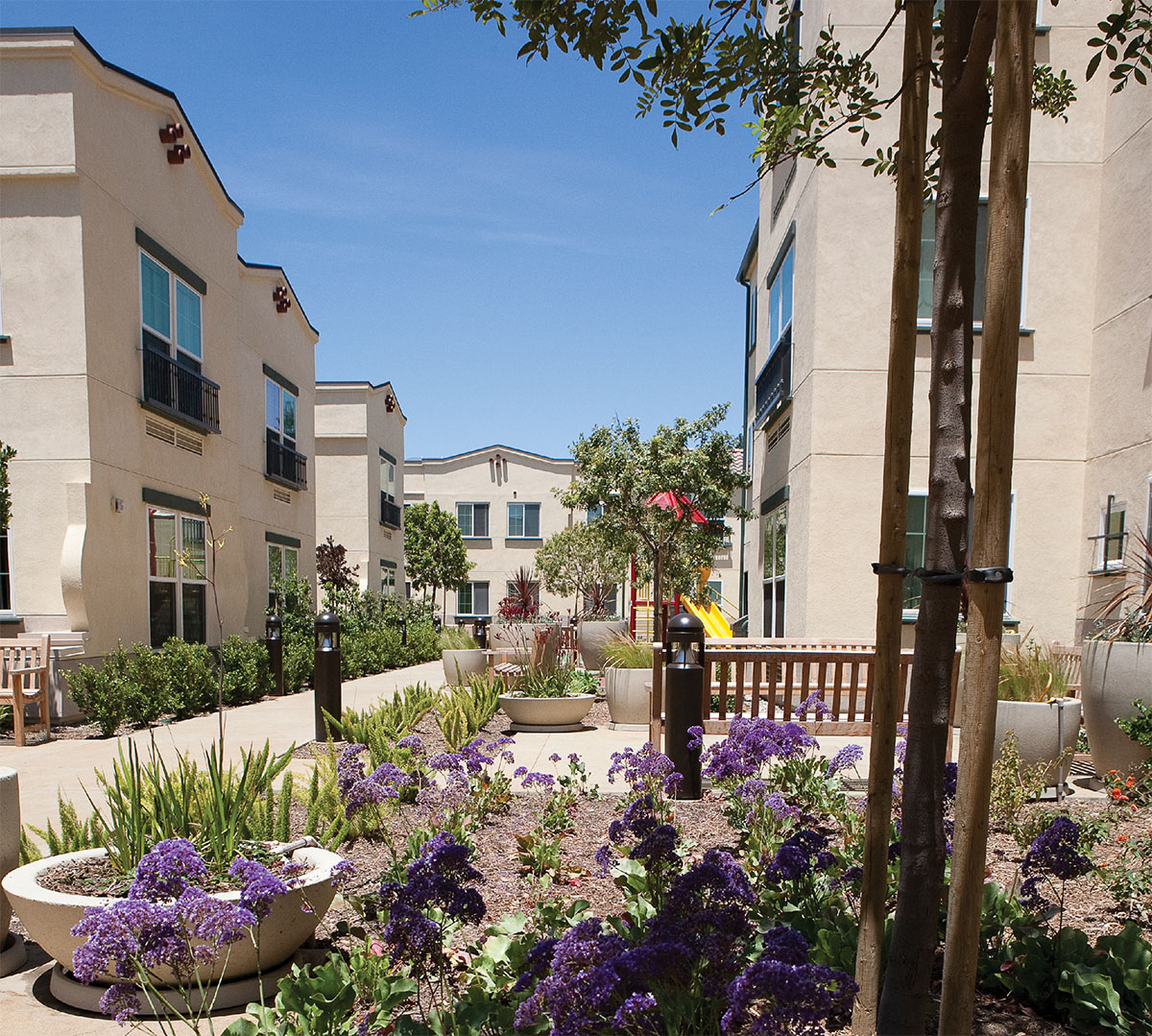
The four pillars
With a number of successful affordable rental and mixed-use projects under its belt since its emergence 40-years ago as the Los Angeles Community Design Center (LACDC), followed by a name change to Abode Communities in 2008, the firm was a natural fit for this project that has transformed a parcel of industrial land that lay vacant for decades into a strong anchor for a developing community.
Abode is one of the only nonprofit affordable housing firms with all of the four pillars necessary for community transformation—development, housing services, resident services and architecture.
Rental housing aimed at very low-income and special needs populations is Abode’s raison d’etre. The demand for such housing in Los Angeles is evidenced by the speed at which Casa Dominguez leased up.
“Our property management group likes to say that we had lease-up in a week, which we did,” said Hughes. The property received its certificate of occupancy in December and by the end of January, 100 percent of the families had moved in. Nearly 900 people applied for residency, more then 10 times the applicants than available units, and Abode Communities maintains a growing waiting list of hopeful future residents.
The community’s one, two, three and four-bedroom units that range from around 650 to 1,400 sq. ft. rent from $396 to $1,279, compared to standard rents in the area of $916 for one-bedroom units to $1,279 for threes. “This market doesn’t call for four-bedroom units, but if it did they would probably rent for $2,000,” said Hughes.
Abode Communities typically targets household families and seniors who earn 60 percent and below of average median income (AMI), but, with Casa Dominguez, they went even deeper on the scale of affordability to ensure that both low-income families and the transitioning youth would be served. “That’s where you get to those units that are just under $400,” said Hughes. Residents of Casa Dominguez earn between 30 and 50 percent of the AMI, or $39,650 for a family of four.
The partnership principle
The project came out of Abode’s long-standing relationship with the county of Los Angeles. Hughes credits the county commission for its strong support of partnerships between affordable housing developers and service groups that serve disadvantaged and special needs populations.
Abode had been working with The Children’s Collective and St. Johns Well Child and Family Center to help them find a site to co-locate a model that included child care and a family resource center with medical and dental healthcare. “The East Rancho Dominguez area has such a high need for these services that the model fit perfectly within that neighborhood. So, we designed a center that locates the early education center on the ground floor and the healthcare clinic on the second,” said Hughes.
The Children’s Collective, a private nonprofit that has been providing preschool and aftercare programs and case-managed family support services in the South Los Angeles area since 1972, operates the family support and childcare center and St. Johns Well Child and Family Center runs the healthcare clinic.
United Friends of the Children, a nonprofit dedicated to supporting foster children as they transition into independent adults, came aboard as a partner later on in the process, also as a result of Abode’s relationship with the county commission.
“Since the project is a combination of one, two, three and four bedrooms, and therefore, the households would be a combination of single individuals and couples up to large families, we felt this resident mix would afford young adults who are transitioning out of the foster care system an opportunity to be in a traditional environment in terms of who their neighbors are and what their community represents,” Hughes said.
Beyond the services offered to residents by its nonprofit partners, Abode Communities’ onsite management provides after-school tutoring, college preparatory classes, career counseling and English as a second language classes.
Information on green living, including seminars on energy usage, also are in the mix. A video monitor in the community room details the property’s energy usage and allows residents to get up-to-date information on their own energy consumption.
Opening doors, transforming lives
The keys to an apartment at Casa Dominguez have opened doors to a new life for people like Martha Ramirez, a nurse and single mother of two young children, who happily traded a tiny one-bedroom apartment in the Rancho Dominguez area for a spacious three-bedroom unit at Casa Dominguez.
“Now we all have a room of our own,” said Ramirez.
Or Geneva Mason, who recently transitioned from foster care with her five-month-old son into an apartment of their own at Casa Dominguez.
“It’s always great to hear about and see families when they move into our affordable housing, but for these young adults aging out of foster care, it was the first time for most of them having their own apartments. I understand that the tears flowed,” said Hughes.
She recalled how one resident stood up at the property dedication and talked about her experience of not only moving into affordable housing of adequate size for a family, but that her child can now attend a childcare center on site and not have to travel 20 miles to access health care.
“Those are transformative things that happened in the neighborhood and in the lives of people and they depict the disciplines within Abode Communities and how we integrate them into the physical design and the complexity of the development. Then how we manage it long-term and add the resident services component. It really demonstrates an important part of the value we bring to the industry in doing our work,” said Hughes.
Green knowledge
Along with the keys to their apartments, Casa Dominguez residents are presented with a gift package of eco-friendly cleaning products and a customized “Green Guide”, developed by the property management team, to thoroughly educate residents about the sustainable features of the entire development, as well as how the various systems in their apartments work and how they benefit the environment while saving money. A separate manual, created for onsite maintenance and operating staff, gives instruction on how to maintain and take care of the property’s sustainable features “We have taken to a new level the engagement of the residents and even our staff in the ongoing operation of Casa Dominguez. We made that organizational commitment a couple years ago and we continue to improve on how we incorporate and then implement sustainability into our developments,” said Hughes.
In fact, Abode Communities was an early adopter of smart growth principals and eco-friendly building materials. The company typically builds infill, urban projects that are pedestrian and transit-oriented, or within close proximity to jobs, schools, and services, and have a mix of commercial, retail and housing. The company’s latest resolution is that all future projects will be built to comply with at least LEED Silver standards.
“But even before there was LEED for Homes for our product type, we committed to sustainability in our projects. That goes from our architects’ passive cooling models in all our buildings to making sure the structures are sited in a way that benefits the tenants by keeping their utility costs down. And we’ve incorporated energy efficient appliances in our developments for a very long time,” said Hughes.
Abodes’ 48-unit Hart Village in Canoga Park, completed in the spring of 2007, was the first affordable housing development in Los Angeles to use a solar energy system to generate power for 55 percent of the common-area utilities.
At Casa Dominguez, 100 percent of the common-area utilities are powered by an 84.87 kW (DC) solar photovoltaic panel array located on the roof of the apartment building.
Another feature unique to Casa Dominguez is the gray-water irrigation system—the first for multifamily in Los Angeles County—that filters and reuses around 300 gallons of water per day discharged from the apartment community’s onsite laundry facility to water the drought-tolerant landscaping in the property’s common areas. Residents must agree to use onsite only environmentally friendly detergents, bleaches and fabric softeners that do not contain synthetic chemicals.
Other sustainable components of Casa Dominguez include a geothermal heat pump, Energy Star appliances and lighting, Low-E windows that help keep heat out during summer and in during winter, dual-flush toilets and low VOC paint, window coverings and recycled contents in carpet.
Instead of air conditioning, each unit contains mechanical equipment, with economizer cycles, that utilizes outside air to maintain room temperature, while natural ventilation keeps the corridors cool. “These features help keep our usage and our residents’ usage down and helps to reduce their energy costs,” pointed out Hughes.
The funding
The project required a complex assemblage of traditional, affordable and green funding sources. They include $13.2 million from U.S. Bank, the Low Income Tax Credit investor; $2.8 million from Citi in permanent financing in addition to a $14 million construction loan for the project; $11 million from the County, through multiple sources, including a special grant of more than $800,000 for the childcare and healthcare facility and an Affordable Housing Program (AHP) grant of $380,000.
The project also received a $14,000 rebate from the Gas Company and $260,000 in solar rebates from So. Cal Edison. Finally, the Parson Foundation provided $250,000 towards the early education and health center.
Hughes noted that when Benchmark Contractors, Inc. broke ground on the project in November 2008, Abode took advantage of soft construction costs during a period of few development starts. “We were fortunate in that we experienced significant cost savings on the project because the construction market changed significantly in the last year. So we were able to upgrade with the support of our public lenders,” she said.
Fourteen months later, Casa Dominguez delivered on schedule and under budget and was fully occupied by January 2010.
What’s next
Abode Communities has been busy wrapping up development on several projects, preparing to break ground on a few and is answering RFPs for several more.
A new market for the firm will be Orange County. “We have met with about a dozen of the cities and, unfortunately not successfully, have submitted responses to RFPs. I think we have some strong prospects and hope in the next three to six months to get a project or two in the pipeline in Orange County,” said Hughes..
Meanwhile, Abode is finishing construction on the 52-unit Ivy Terrace in Van Nuys that is planned for working families with incomes between $22,200 and $44,400 per year. Rents will range from $378 to $1,222 for one- to four-bedroom apartments are approximately 650 to 1,250 sq. ft. The property has a special needs component that will serve survivors of domestic violence and families that are coming out of transitional into supportive housing.
Also under construction are several senior housing developments, as well as a joint-use project with the Los Angeles Unified School District using surplus land owned by the district that incorporates housing and an early education center in the Glassell Park neighborhood. Abode is negotiating with the district for a second joint-use project in the Hollywood area.
Abode also is working with the redevelopment agency to acquire seven acres of industrial land in South Los Angeles that is completely surrounded by residential to develop affordable housing, a park that will be owned by Parks & Recreation and a community use that will be a charter school, or another community service use. “The latter is in the early stages, but demonstrates our multifaceted ability, including dealing with blight, land use issues, serving the broad needs of a community and doing transformative development that has a big impact on the community,” said Hughes.
Abode is revisiting a business it hasn’t participated in for several years—acquisition rehab. “We are looking at doing that either through covenants that are expiring, since we have the ability to jump in and acquire those properties, or with properties that haven’t done well in the market and that are on the market now,” said Hughes.
“We are very lucky during this challenging time to be able to sustain a strong pipeline for the organization and continue to do the work of producing high quality affordable housing,” she said.
Author Wendy Broffman


